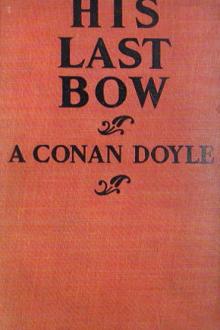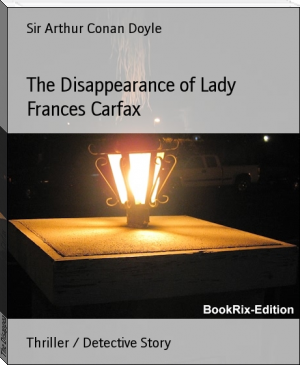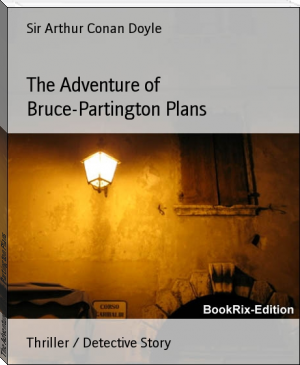His Last Bow, Arthur Conan Doyle [love books to read TXT] 📗

- Author: Arthur Conan Doyle
- Performer: -
Book online «His Last Bow, Arthur Conan Doyle [love books to read TXT] 📗». Author Arthur Conan Doyle
without me, and it causes an unhealthy excitement among the
criminal classes. Go, then, my dear Watson, and if my humble
counsel can ever be valued at so extravagant a rate as two pence
a word, it waits your disposal night and day at the end of the
Continental wire.”
Two days later found me at the Hotel National at Lausanne, where
I received every courtesy at the hands of M. Moser, the well-known manager. Lady Frances, as he informed me, had stayed there
for several weeks. She had been much liked by all who met her.
Her age was not more than forty. She was still handsome and bore
every sign of having in her youth been a very lovely woman. M.
Moser knew nothing of any valuable jewellery, but it had been
remarked by the servants that the heavy trunk in the lady’s
bedroom was always scrupulously locked. Marie Devine, the maid,
was as popular as her mistress. She was actually engaged to one
of the head waiters in the hotel, and there was no difficulty in
getting her address. It was 11 Rue de Trajan, Montpellier. All
this I jotted down and felt that Holmes himself could not have
been more adroit in collecting his facts.
Only one corner still remained in the shadow. No light which I
possessed could clear up the cause for the lady’s sudden
departure. She was very happy at Lausanne. There was every
reason to believe that she intended to remain for the season in
her luxurious rooms overlooking the lake. And yet she had left
at a single day’s notice, which involved her in the useless
payment of a week’s rent. Only Jules Vibart, the lover of the
maid, had any suggestion to offer. He connected the sudden
departure with the visit to the hotel a day or two before of a
tall, dark, bearded man. “Un sauvage—un veritable sauvage!”
cried Jules Vibart. The man had rooms somewhere in the town. He
had been seen talking earnestly to Madame on the promenade by the
lake. Then he had called. She had refused to see him. He was
English, but of his name there was no record. Madame had left
the place immediately afterwards. Jules Vibart, and, what was of
more importance, Jules Vibart’s sweetheart, thought that this
call and the departure were cause and effect. Only one thing
Jules would not discuss. That was the reason why Marie had left
her mistress. Of that he could or would say nothing. If I
wished to know, I must go to Montpellier and ask her.
So ended the first chapter of my inquiry. The second was devoted
to the place which Lady Frances Carfax had sought when she left
Lausanne. Concerning this there had been some secrecy, which
confirmed the idea that she had gone with the intention of
throwing someone off her track. Otherwise why should not her
luggage have been openly labelled for Baden? Both she and it
reached the Rhenish spa by some circuitous route. This much I
gathered from the manager of Cook’s local office. So to Baden I
went, after dispatching to Holmes an account of all my
proceedings and receiving in reply a telegram of half-humorous
commendation.
At Baden the track was not difficult to follow. Lady Frances had
stayed at the Englischer Hof for a fortnight. While there she
had made the acquaintance of a Dr. Shlessinger and his wife, a
missionary from South America. Like most lonely ladies, Lady
Frances found her comfort and occupation in religion. Dr.
Shlessinger’s remarkable personality, his whole hearted devotion,
and the fact that he was recovering from a disease contracted in
the exercise of his apostolic duties affected her deeply. She
had helped Mrs. Shlessinger in the nursing of the convalescent
saint. He spent his day, as the manager described it to me, upon
a lounge-chair on the veranda, with an attendant lady upon either
side of him. He was preparing a map of the Holy Land, with
special reference to the kingdom of the Midianites, upon which he
was writing a monograph. Finally, having improved much in
health, he and his wife had returned to London, and Lady Frances
had started thither in their company. This was just three weeks
before, and the manager had heard nothing since. As to the maid,
Marie, she had gone off some days beforehand in floods of tears,
after informing the other maids that she was leaving service
forever. Dr. Shlessinger had paid the bill of the whole party
before his departure.
“By the way,” said the landlord in conclusion, “you are not the
only friend of Lady Frances Carfax who is inquiring after her
just now. Only a week or so ago we had a man here upon the same
errand.”
“Did he give a name?” I asked.
“None; but he was an Englishman, though of an unusual type.”
“A savage?” said I, linking my facts after the fashion of my
illustrious friend.
“Exactly. That describes him very well. He is a bulky, bearded,
sunburned fellow, who looks as if he would be more at home in a
farmers’ inn than in a fashionable hotel. A hard, fierce man, I
should think, and one whom I should be sorry to offend.”
Already the mystery began to define itself, as figures grow
clearer with the lifting of a fog. Here was this good and pious
lady pursued from place to place by a sinister and unrelenting
figure. She feared him, or she would not have fled from
Lausanne. He had still followed. Sooner or later he would
overtake her. Had he already overtaken her? Was THAT the secret
of her continued silence? Could the good people who were her
companions not screen her from his violence or his blackmail?
What horrible purpose, what deep design, lay behind this long
pursuit? There was the problem which I had to solve.
To Holmes I wrote showing how rapidly and surely I had got down
to the roots of the matter. In reply I had a telegram asking for
a description of Dr. Shlessinger’s left ear. Holmes’s ideas of
humour are strange and occasionally offensive, so I took no
notice of his ill-timed jest—indeed, I had already reached
Montpellier in my pursuit of the maid, Marie, before his message
came.
I had no difficulty in finding the ex-servant and in learning all
that she could tell me. She was a devoted creature, who had only
left her mistress because she was sure that she was in good
hands, and because her own approaching marriage made a separation
inevitable in any case. Her mistress had, as she confessed with
distress, shown some irritability of temper towards her during
their stay in Baden, and had even questioned her once as if she
had suspicions of her honesty, and this had made the parting
easier than it would otherwise have been. Lady Frances had given
her fifty pounds as a wedding-present. Like me, Marie viewed
with deep distrust the stranger who had driven her mistress from
Lausanne. With her own eyes she had seen him seize the lady’s
wrist with great violence on the public promenade by the lake.
He was a fierce and terrible man. She believed that it was out
of dread of him that Lady Frances had accepted the escort of the
Shlessingers to London. She had never spoken to Marie about it,
but many little signs had convinced the maid that her mistress
lived in a state of continual nervous apprehension. So far she
had got in her narrative, when suddenly she sprang from her chair
and her face was convulsed with surprise and fear. “See!” she
cried. “The miscreant follows still! There is the very man of
whom I speak.”
Through the open sitting-room window I saw a huge, swarthy man
with a bristling black beard walking slowly down the centre of
the street and staring eagerly at he numbers of the houses. It
was clear that, like myself, he was on the track of the maid.
Acting upon the impulse of the moment, I rushed out and accosted
him.
“You are an Englishman,” I said.
“What if I am?” he asked with a most villainous scowl.
“May I ask what your name is?”
“No, you may not,” said he with decision.
The situation was awkward, but the most direct way is often the
best.
“Where is the Lady Frances Carfax?” I asked.
He stared at me with amazement.
“What have you done with her? Why have you pursued her? I
insist upon an answer!” said I.
The fellow gave a below of anger and sprang upon me like a tiger.
I have held my own in many a struggle, but the man had a grip of
iron and the fury of a fiend. His hand was on my throat and my
senses were nearly gone before an unshaven French ouvrier in a
blue blouse darted out from a cabaret opposite, with a cudgel in
his hand, and struck my assailant a sharp crack over the forearm,
which made him leave go his hold. He stood for an instant fuming
with rage and uncertain whether he should not renew his attack.
Then, with a snarl of anger, he left me and entered the cottage
from which I had just come. I turned to thank my preserver, who
stood beside me in the roadway.
“Well, Watson,” said he, “a very pretty hash you have made of it!
I rather think you had better come back with me to London by the
night express.”
An hour afterwards, Sherlock Holmes, in his usual garb and style,
was seated in my private room at the hotel. His explanation of
his sudden and opportune appearance was simplicity itself, for,
finding that he could get away from London, he determined to head
me off at the next obvious point of my travels. In the disguise
of a workingman he had sat in the cabaret waiting for my
appearance.
“And a singularly consistent investigation you have made, my dear
Watson,” said he. “I cannot at the moment recall any possible
blunder which you have omitted. The total effect of your
proceeding has been to give the alarm everywhere and yet to
discover nothing.”
“Perhaps you would have done no better,” I answered bitterly.
“There is no ‘perhaps’ about it. I HAVE done better. Here is
the Hon. Philip Green, who is a fellow-lodger with you in this
hotel, and we may find him the starting-point for a more
successful investigation.”
A card had come up on a salver, and it was followed by the same
bearded ruffian who had attacked me in the street. He started
when he saw me.
“What is this, Mr. Holmes?” he asked. “I had your note and I
have come. But what has this man to do with the matter?”
“This is my old friend and associate, Dr. Watson, who is helping
us in this affair.”
The stranger held out a huge, sunburned hand, with a few words of
apology.
“I hope I didn’t harm you. When you accused me of hurting her I
lost my grip of myself. Indeed, I’m not responsible in these
days. My nerves are like live wires. But this situation is
beyond me. What I want to know, in the first place, Mr. Holmes,
is, how in the world you came to hear of my existence at all.”
“I am in touch with Miss Dobney, Lady Frances’s governess.”
“Old Susan Dobney with the mob cap! I remember her well.”
“And she remembers you. It was in the days before—before you
found it better to go to South Africa.”
“Ah, I see you know





Comments (0)